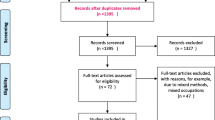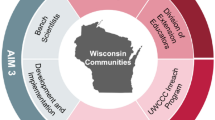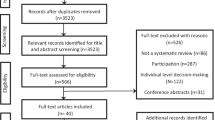Abstract
Between 2000 and 2011, over 170 second-year medical students participated in a Determinants of Community Health (DOCH 2) project at Princess Margaret Hospital (PMH). Students undertook community-based research projects at the hospital or with PMH community partners involving activities such as producing a literature review, writing a research proposal, obtaining ethics approval, carrying out data collection and analysis, presenting their data to classmates and supervisors, and production of a final report. An electronic survey consisting of both quantitative and qualitative questions was developed to evaluate the PMH-DOCH 2 program and was distributed to 144 past students with known email addresses. Fifty-eight students responded, a response rate of 40.3 %. Data analysis indicates that an increase in oncology knowledge, awareness of the impact of determinants of health on patients, and knowledge of research procedures increased participants’ satisfaction and ability to conduct research following DOCH 2. Furthermore, the PMH-DOCH 2 program enhanced the development of CanMEDS competencies through career exploration and patient interaction as well as through shadowing physicians and other allied health professionals. In addition, some students felt their PMH-DOCH 2 projects played a beneficial role during their residency matching process. The PMH-DOCH 2 research program appeared to provide a positive experience for most participants and opportunities for medical students’ professional growth and development outside the confines of traditional lecture-based courses.
Similar content being viewed by others

References
Frank JR (Ed) (2005) The CanMEDS 2005 physician competency framework. Better standards. Better physicians. Better care. Ottawa: The Royal College of Physicians and Surgeons of Canada, p 37. http://www.royalcollege.ca/portal/page/portal/rc/common/documents/canmeds/resources/publications/framework_full_e.pdf
Eaton DG, Thong YH (1985) The Bachelor of Medical Science research degree as a start for clinician-scientists. J Med Educ 19(6):445–451
Frishman WH (2001) Student research projects and theses: should they be a requirement for medical school graduation? Heart Dis 3(3):140–144
Reinders JJ, Kropmans TJ, Cohen-Schotanus J (2005) Extracurricular research experience of medical students and their scientific output after graduation. J Med Educ 39(2):237
Solomon SS, Tom SC, Pichert J, Wasserman D, Powers AC (2003) Impact of medical student research in the development of physician-scientists. J Investig Med 51(3):149–156
Richardson WM, Wilson MC, Guyatt GH, Cook DJ, Nishikawa J (1999) Users guide to medical literature. JAMA 281:1214–1219
University of Toronto Faculty of Medicine (2011). Program. In Undergraduate medical education, University of Toronto. November 2011. http://www.md.utoronto.ca/program.htm. Accessed 7 Oct 2013
Jones J, Nyhof-Young J, Friedman A, Catton P (2001) More than just a pamphlet: development of an innovative computer-based education program for cancer patients. J Patient Educ Couns 44(3):271–281
Princess Margert Hospital (2011). Survivorship program. http://www.survivorship.ca/. Accessed November 18, 2013
ELLISCR (2011). Health wellness and cancer survivorship. http://www.ellicsr.ca Accessed November 18, 2013
Toubassi D, Himel D, Winton S, Nyhof-Young J (2006) The informational needs of newly diagnosed cervical cancer patients who will be receiving combined chemoradiation treatment. J Cancer Educ 21(4):263–268
MacCulloch R, Donaldson S, Nicholas D, Nyhof-Young J, Hetherington R, Lupea D, Wright J (2009) Towards an understanding of the information and support needs of surgical adolescent idiopathic scoliosis patients: a qualitative analysis. Scoliosis 4:12–21
Wong J, Mendelsohn D, Nyhof-Young J, Bernstein M (2011) A qualitative assessment of the supportive care and resource needs of patients undergoing craniotomy for benign brain tumours. Support Care Cancer 19(11):1841–1848
Tullio-Pow S, Schaefer K, Zhu R, Kolenchenko O, Nyhof-Young J. Sweet dreams: needs assessment and prototype design of post-mastectomy sleepwear. Peer Reviewed Proceedings of Include 2011: The Role of Inclusive Design in Making Social Innovation Happen. http://include11.kinetixevents.co.uk/4dcgi/prog?operation=detail&paper_id=378
Sterling L, Nyhof-Young J, Blanchette VS, Breakey VR (2011) Exploring Internet needs and use among adolescents with haemophilia: current practices and insights into website desirability features. Haemophilia 18(2):216–221. doi:10.1111/j.1365-2516.2011.02613.x
Brame D, Kolin D, Chung P, Nyhof-Young J (2011) Don’t forget to check your comics! Developing ‘novel’ resources to educate young men about testicular cancer. Intern J Comic Art 13:441–457
Wiljer D, Urowitz S, Frasca E, Nyhof-Young J, Secord S, Walton T, Catton P (2010) The role of a clinician-led reflective interview on improving self-efficacy in breast cancer survivors: a pilot study. J Cancer Educ 25(3):457–463
Taggart L, Ozolins L, Hardie H, Nyhof-Young J (2009) Look good feel better workshops: a ‘big lift’ for women with cancer. J Cancer Educ 24(2):94–99
Chung AD, Ng D, Wang L, Garraway C, Bezjak A, Nyhof-Young J, Wong RKS (2009) Informational stories: a complementary strategy for patients and caregivers with brain metastases. Curr Oncol 16(3):174–179
Kitamura C, Garraway C, Ng D, Chung A, Damaraju D, Bezjak A, Millar B-A, Levin W, Mclean M, Dinniwell R, Nyhof-Young J, Wong R (2011) Messages in a story: evaluation of a combined story and fact based educational booklet for patients with brain metastases and their caregivers. J Palliat Med 25(6):642–649
Sze J, Marisette S, Williams D, Nyhof-Young J, Crooks D, Husain A, Bezjak A, Wong R (2006) Decision making in palliative radiation therapy: reframing hope in caregivers and patients with brain metastases. Support Care Cancer 14(10):1055–1063
Kirkpatrick D (1967) Evaluation of Training. In: Craig R, Bittel L (eds) Training and development handbook. McGraw-Hill, New York, pp 131–167
IBM Corp. Released (2010) IBM SPSS Statistics for Windows, Version 19.0. IBM Corp, Armonk
Author information
Authors and Affiliations
Corresponding author
Rights and permissions
About this article
Cite this article
Fernando, E., Jusko-Friedman, A., Catton, P. et al. Celebrating 10 Years of Undergraduate Medical Education: A Student-Centered Evaluation of the Princess Margaret Cancer Centre—Determinants of Community Health Year 2 Program. J Canc Educ 30, 225–230 (2015). https://doi.org/10.1007/s13187-014-0674-2
Published:
Issue Date:
DOI: https://doi.org/10.1007/s13187-014-0674-2



